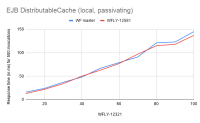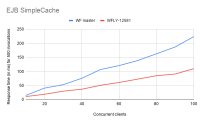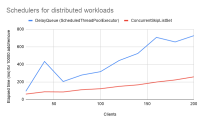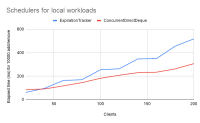Details
-
Enhancement
-
Resolution: Done
-
Major
-
18.0.0.Beta1
-
None
Description
WFLY-12321 added a new expiration scheduler implementation for SFSBs specifically optimized for non-distributed environments. The key features of this implementations are:
- Uses a single scheduled task instead of a scheduled task per SFSB
- Uses a double-linked list to track SFSBs to be expired
Because most scheduled tasks will be canceled before they are executed, the performance of a given scheduler implementation is primarily limited by the cost of insertion and removal into the backing data structure. The goal of this jira is to generalize the scheduler implementation introduced by WFLY-12321 such that it can be used for scheduling of both local and distributed web sessions and SFSBs.
In the scheduler implemented as part of WFLY-12321, the use of a linked queue is based on the following assumptions:
- All SFSB using a given scheduler use the same @StatefulTimeout
- A given call to Scheduler.schedule(...) is always the last item to be scheduled
Unfortunately, the second assumption is not valid for distributed SFSBs as a member may assume the responsibility of expiring a SFSB previously owned by another member.
Additionally, the second assumption is not valid for local nor distributed web sessions, as a given web session can override the default session timeout of the application.
This jira proposes the following:
- Generalize the Scheduler interface for reuse between SFSBs and web sessions.
- Generalize the new local scheduler implementation such that the same scheduler can support both local and distributed objects using different data structures for tracking scheduled items
- Replace ExpirationTracker with a ConcurrentDirectDeque to support local case, which has O(1) add/remove characteristics
- ConcurrentDirectDeque outperforms ExpirationTracker under concurrent load (see attached graph)
- Local web sessions and all distributed use cases will store scheduled entries within a ConcurrentSkipListSet, which has O(log N) add/remove characteristics
Attachments
Issue Links
- relates to
-
WFLY-12321 Use a single non-cancelling task per bean manager for tracking passivation expiration
-
- Closed
-



